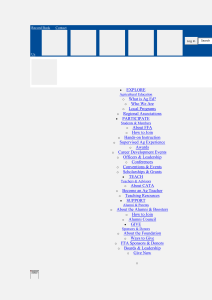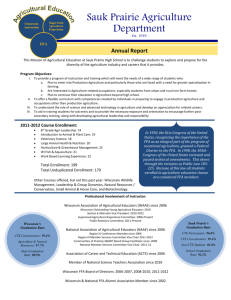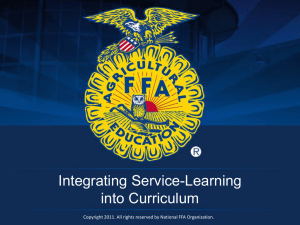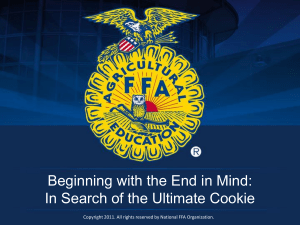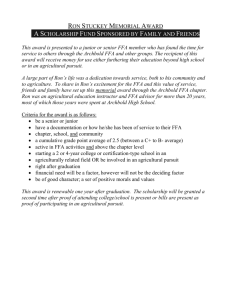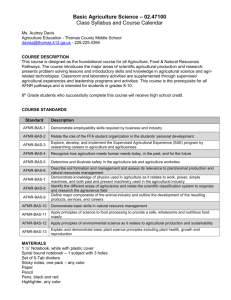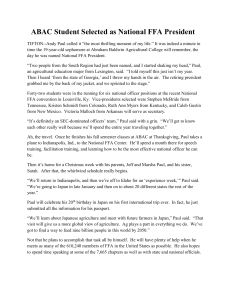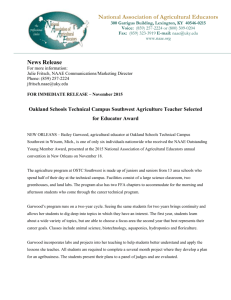Freedom - Wisconsin Association of Agricultural Educators
advertisement
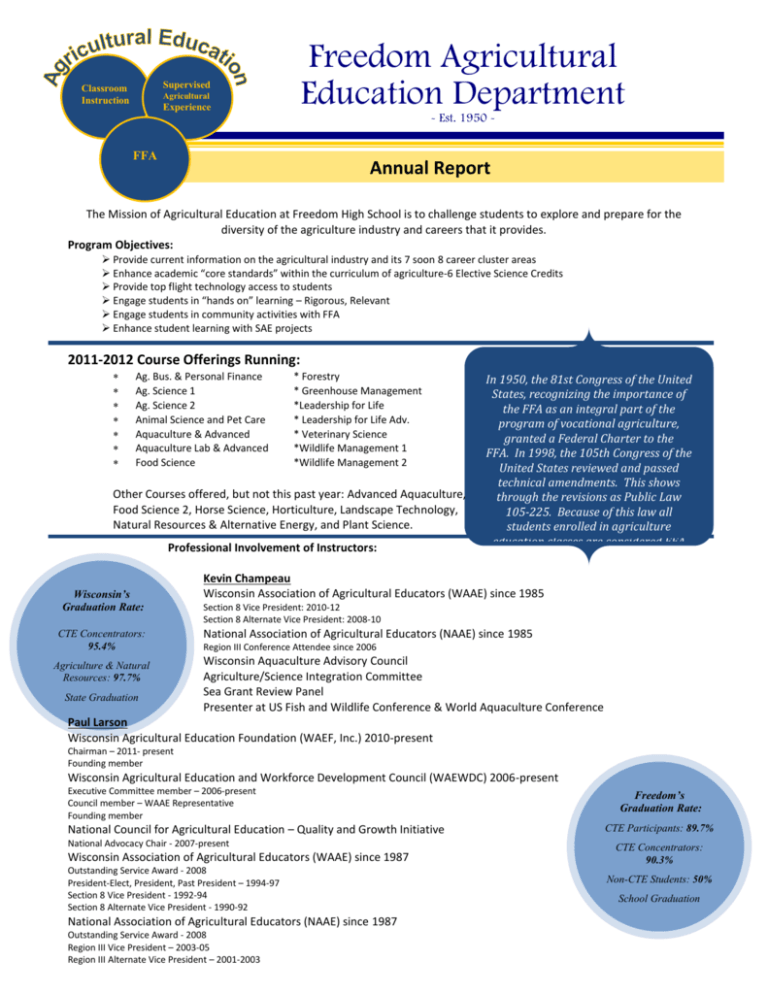
Freedom Agricultural Education Department Supervised Classroom Instruction Agricultural Experience - Est. 1950 FFA Annual Report The Mission of Agricultural Education at Freedom High School is to challenge students to explore and prepare for the diversity of the agriculture industry and careers that it provides. Program Objectives: Provide current information on the agricultural industry and its 7 soon 8 career cluster areas Enhance academic “core standards” within the curriculum of agriculture-6 Elective Science Credits Provide top flight technology access to students Engage students in “hands on” learning – Rigorous, Relevant Engage students in community activities with FFA Enhance student learning with SAE projects 2011-2012 Course Offerings Running: Ag. Bus. & Personal Finance Ag. Science 1 Ag. Science 2 Animal Science and Pet Care Aquaculture & Advanced Aquaculture Lab & Advanced Food Science * Forestry * Greenhouse Management *Leadership for Life * Leadership for Life Adv. * Veterinary Science *Wildlife Management 1 *Wildlife Management 2 Other Courses offered, but not this past year: Advanced Aquaculture, Food Science 2, Horse Science, Horticulture, Landscape Technology, Natural Resources & Alternative Energy, and Plant Science. Professional Involvement of Instructors: Wisconsin’s Graduation Rate: CTE Concentrators: 95.4% Agriculture & Natural Resources: 97.7% State Graduation Rate: 89.9% In 1950, the 81st Congress of the United States, recognizing the importance of the FFA as an integral part of the program of vocational agriculture, granted a Federal Charter to the FFA. In 1998, the 105th Congress of the United States reviewed and passed technical amendments. This shows through the revisions as Public Law 105-225. Because of this law all students enrolled in agriculture education classes are considered FFA Kevin Champeau Wisconsin Association of Agricultural Educators (WAAE) since 1985 Section 8 Vice President: 2010-12 Section 8 Alternate Vice President: 2008-10 National Association of Agricultural Educators (NAAE) since 1985 Region III Conference Attendee since 2006 Wisconsin Aquaculture Advisory Council Agriculture/Science Integration Committee Sea Grant Review Panel Presenter at US Fish and Wildlife Conference & World Aquaculture Conference Paul Larson Wisconsin Agricultural Education Foundation (WAEF, Inc.) 2010-present Chairman – 2011- present Founding member Wisconsin Agricultural Education and Workforce Development Council (WAEWDC) 2006-present Executive Committee member – 2006-present Council member – WAAE Representative Founding member National Council for Agricultural Education – Quality and Growth Initiative National Advocacy Chair - 2007-present Wisconsin Association of Agricultural Educators (WAAE) since 1987 Outstanding Service Award - 2008 President-Elect, President, Past President – 1994-97 Section 8 Vice President - 1992-94 Section 8 Alternate Vice President - 1990-92 National Association of Agricultural Educators (NAAE) since 1987 Outstanding Service Award - 2008 Region III Vice President – 2003-05 Region III Alternate Vice President – 2001-2003 Freedom’s Graduation Rate: CTE Participants: 89.7% CTE Concentrators: 90.3% Non-CTE Students: 50% School Graduation Rate: 89.1% Agriculture Education Highlights: Through agricultural education, students are provided opportunities for leadership development, personal growth and career success. Agricultural education instruction is delivered through three major components: Classroom Instruction: The Freedom High School Agricultural Education Department features the following: Classroo m Instructi on 2- 20 computer mobile carts 20’ x 30’ animal lab 10’ by 60’ greenhouse Wisconsin’s premier aquaculture lab facility – 1000+ square feet Curriculum utilizing the MyCAERT programs; includes online text and testing materials SMART Board Technologies 2- Science ready classrooms with equipment and supplies Hands-on Education: greenhouse operation, aquaculture production tanks, aquaponics teaching station, taxidermy, fishing lure construction, feed formulations, microscopic investigations, genetic studies, animal evaluations, animal grooming & care, and much more. Supervised Agricultural Experience (SAE): All students in agricultural education are required to conduct an SAE during their time in class. SAE projects are designed to be tailored to the interests of the student. Here are some examples: Supervise d Agricultur al Experienc e Owning animals: beef, swine, dairy, dogs, cats, etc. Working for local businesses: cheese store, ag service companies, meat locker, etc. Improving wildlife; trapping animals, thinning tree stands, food plot developments, etc. Working with plants: working for local greenhouses, planting and harvesting crops, etc. General Farm-hand work: milking dairy animals, crop field work, etc. Veterinary Care: working for local veterinary clinics in the animal housing areas Students are eligible to complete an award application through FFA for their work on their SAE There are over 40 areas students can choose from!!! FFA: The Freedom Agricultural Education Program is now an affiliated program which means all students enrolled in agricultural education are FFA members. There are no dues to pay and the level of involvement will vary with the student’s desires. The FFA chapter has accomplished the following items in 2011-2012: FFA 5th Gold Chapter in the State of Wisconsin out of 250+ chapters 3-Star Chapter at the National Level (one of 204 chapters out of 7,200+ chapters in the nation) Students earned different levels of FFA degrees: Greenhand Degrees (First Year Members in High School), Chapter Degrees (Sophomores & Juniors), State Degrees (Seniors & Graduates), American FFA Degree (Graduates) 1 State Proficiency Award Winner 1 National Proficiency Award Finalist 3rd Place in Community Development Division of National Chapter Award areas. 10th Place in Chapter Development Division of National Chapter Award areas. Community Donations: Over 1000 lbs. of food collected for the Freedom Food Pantry Volunteering: 9-11 Walk, Sorting food for the Food Pantry, Breakfast on the Farm, Adopt-A-Highway on Hwy. 55, tree planting, school landscape maintenance, cancer fund drive. Science Equivalency Courses: The DPI has approved the elective science credits for students of the agricultural education program who take the following courses. These elective science credits are eligible for use at all Wisconsin Technical Colleges and all Wisconsin’s 4-Year Universities. Ag. Science 1 – ½ credit *Animal Science & Pet Care – ½ credit Ag. Science 2 – ½ credit *Veterinarian Science – ½ credit Plant Science – 1 credit *Biotechnology – ½ credit The Freedom Ag. Education Program is supported by a very active and generous FFA Alumni Affiliate . FFA Alumni Support FFA and Classroom Instruction 2009 = $10,672 2010 = $11, 783 2011 = $20,695
